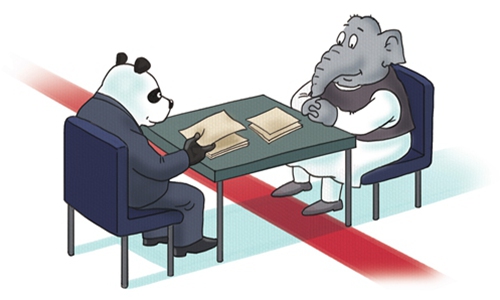India gained only casualties from border clash
By Hu Xijin Source:Global Times Published: 2020/6/24 20:43:40

Illustration: GT
Chinese and Indian troops held a second round of commander-level talks in the border area on Monday. Authorities from the two countries conveyed a positive message that the meeting had made positive progress. According to the Indian military, the talks took place in "a cordial, positive and constructive atmosphere", and the two sides discussed ways to disengage border troops. Yet Indian media's coverage of the meeting, portraying how tough the Indian side has been, is strikingly self-deceiving.
Since the bloody brawl in the Galwan Valley broke out on June 15, ultra-nationalist forces in India have been making rising noise. The Indian media later claimed that at least 40 Chinese soldiers were killed, and alleged that India had handed over the bodies of 16 Chinese soldiers. Such rumors are going unchallenged in India, and Indian public are using this rumor to further promote nationalist sentiment. In the last two days, the Indian side has said it will no longer abide by an agreement that soldiers on both sides are bound by restrictions on no-use of firearms. The primary purpose of the tough posturing is purported to address the frustration and anger in Indian public opinion.
Taking into account the restraint and moderation of the Chinese side after the June 15 incident, the unprecedented frenzy, ruthlessness and frustration of Indian public opinion and the behavior of both sides after the conflict, I come to the conclusion that the Indian side had gained nothing from the latest clash except a large number of casualties.
In this conflict triggered by the Indian side, the Chinese People's Liberation Army (PLA) has dealt a heavy blow to India's ambition of encroaching on China's territory and demonstrated to the Indian side the iron will of the PLA in defending Chinese territorial integrity. The PLA has taught a lesson to the Indian side, which has always misjudged Chinese people's determination and advantages.
The PLA has demonstrated its strength and determination to use force when necessary, which is a strong deterrent to the Indian side, especially their frontline troops. The PLA not only showed its ability to bring the situation under control, but also gained a psychological advantage over the Indian army on the ground.
The PLA is a glorious army. After the founding of the People's Republic of China, it fought with the armies of the two superpowers, the US and the former Soviet Union. It has punished the Indian army for the latter's outright provocations. Some in India preach that the PLA, which has not fought a war for more than 30 years now, is an army that does not know how to fight. Their arrogance is frivolous. It is now clear who is the egg and who is the rock.
The PLA did not fight for the last 30 years because we love peace. Don't mess with the PLA. That is our stern warning to those who want to take advantage of changes in the international situation to challenge China's core interests.
I would like to pay high tribute to the PLA officers and soldiers. China's security and the tranquility of China's borders depend upon them. Thus far, the Chinese military has not released any information about the deceased. As both a former soldier and current media professional, I understand that this is an expedient move with the aim of not irritating public opinion in the two countries, especially in India. This is Beijing's goodwill. I believe that the dead have been treated with the highest respect in the military, and that the information will eventually be reported to society at the right time, so that heroes can be honored and remembered as they deserve.
I believed the PLA has made a strong deployment and is ready to hit the hysterical intruders hard. At the same time, this deployment aims to avoid the occurrence of greater conflicts. We hope that the Indian army will wake up and stop being tempted by the ultra-nationalist forces at home, and refrain from flaunting its muscles, lest its soldiers lose their lives and push the country into a serious strategic dilemma.
The author is editor-in-chief of the Global Times. opinion@globaltimes.com.cn
Posted in: VIEWPOINT